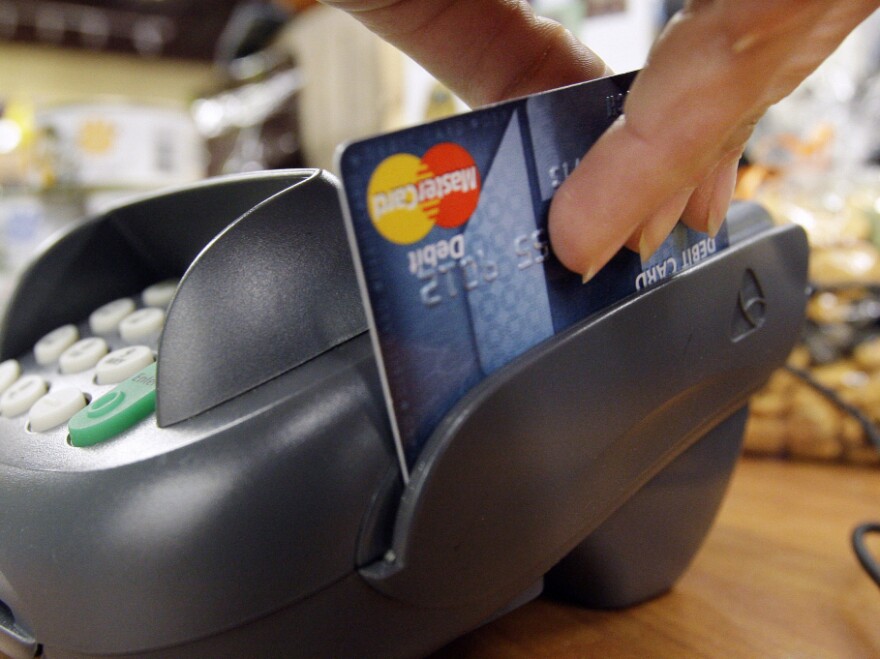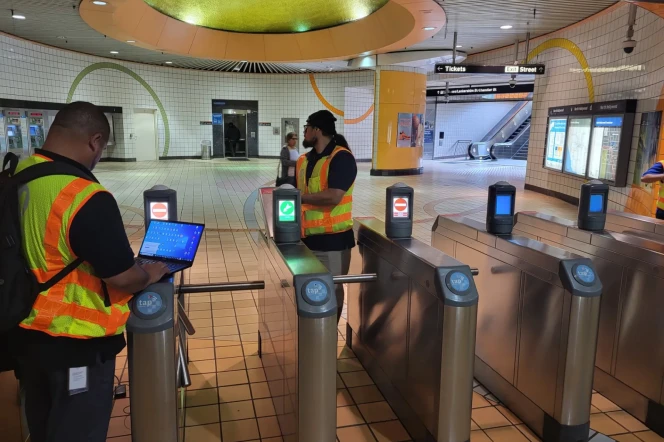With our free press under threat and federal funding for public media gone, your support matters more than ever. Help keep the LAist newsroom strong, become a monthly member or increase your support today.
The Nation: You Swipe Card, Banks Swipe Cash

George grew up in Buffalo, NY and holds a B.A. in English from the State University of New York at Buffalo. Prior to joining The Nation, George was Senior Reporter/Blogger for ThinkProgress.org. He worked as a researcher for Michael Moore's SiCKO and as an Associate Producer on "The Media Project" on the Independent Film Channel. His work has been published in The Los Angeles Times, Media Matters, and The Buffalo News.
Earlier this month, we reported on the Senate battle over "swipe fees," which banks charge merchants for processing credit or debit cards. It appeared the story was over, and an effort by banks to maintain high swipe fees was vanquished — but an eleventh-hour action by the Federal Reserve Wednesday has given Wall Street yet another astonishing victory in Washington.
The average swipe fee in America is 44 cents, the highest rate in the world. In December, the Federal Reserve released an analysis saying that banks could still make profit by charging 12 cents per transaction, and under the Dodd-Frank financial reform, planned to enforce this cap starting yesterday.
Banks — which collect $20 billion every year from swipe fees — naturally did not want this revenue reduced by almost 75 percent. Early this year, they launched a massive lobbying campaign to pass a bill by Senator Jon Tester (D-MT) that would delay the Federal Reserve's cap. Retailers, who claim high fees drive up prices and hurt the bottom line of small stores, had their own well-funded campaign to defeat the bill, and ultimately prevailed. On June 8, Tester's bill failed to win a cloture vote.
It was a ridiculously expensive battle, utilizing hundreds of lobbyists and tens of millions of dollars in contributions and advertising. Senator Dick Durbin (D-IL) joked that it was a "full employment" bill, because "everybody who is a lobbyist in Washington is working on this amendment." Senator Lindsey Graham said that "everybody and their grandmother's lobbying on this" and added it was in the "top ten" of brutal and well-funded lobbying battles that he's seen.
The takeaway was that Wall Street could be defeated in Washington, but perhaps only by an equally well-funded special interest. As it turns out, even that assessment undersold the banks' influence. Wednesday, less than twenty-four hours before their rules were to go into effect, the Federal Reserve announced it would cap the fees at as high as 24 cents, not 12.
In announcing that the Fed would double the proposed cap, chairman Ben Bernanke said "I think this is the best available solution that implements the will of Congress and makes good economic decisions." Alongside the Senate fight, Wall Street has also been pressuring the Fed to help them out, and apparently their pleas have been heard.
Even though the 12-cent cap imposed a 75 percent reduction, the profit margin on 12 cents was still 70 percent. When Bernanke spoke of a "good economic decision" by doubling that cap, he could only have been speaking of bank balance sheets.
Moreover, the Fed's action essentially exempts debit-card swipes from the regulation. As Zach Carter explains at the Huffington Post, the 44-cent swipe fee average is actually a composite of two different averages. When you swipe your card at a store and choose "credit" and provide a signature, the average fee charged by banks is 56 cents. When you choose debit and enter a PIN number, the average fee is 23 cents.
Thus, by capping swipe fees at 24 cents, the Fed is basically freeing all debit card transactions from regulation. Retailers are not pleased. "The Federal Reserve very clearly did not follow through on the intent of the law," Mallory Duncan, chairman of the Merchants Payments Coalition, told Carter. "The [Fed] board members are overwhelmingly bankers, so they decided to take several billion more from the public and give it to the banks," he added in comments to The Hill.
Duncan also said retailers will be looking at ways to "challenge" the Fed's ruling. Washington lobbyists, call your office.
Copyright 2022 The Nation. To see more, visit
The Nation
. 9(MDA1OTI3MjQ5MDEyODUwMTE2MzM1YzNmZA004))







